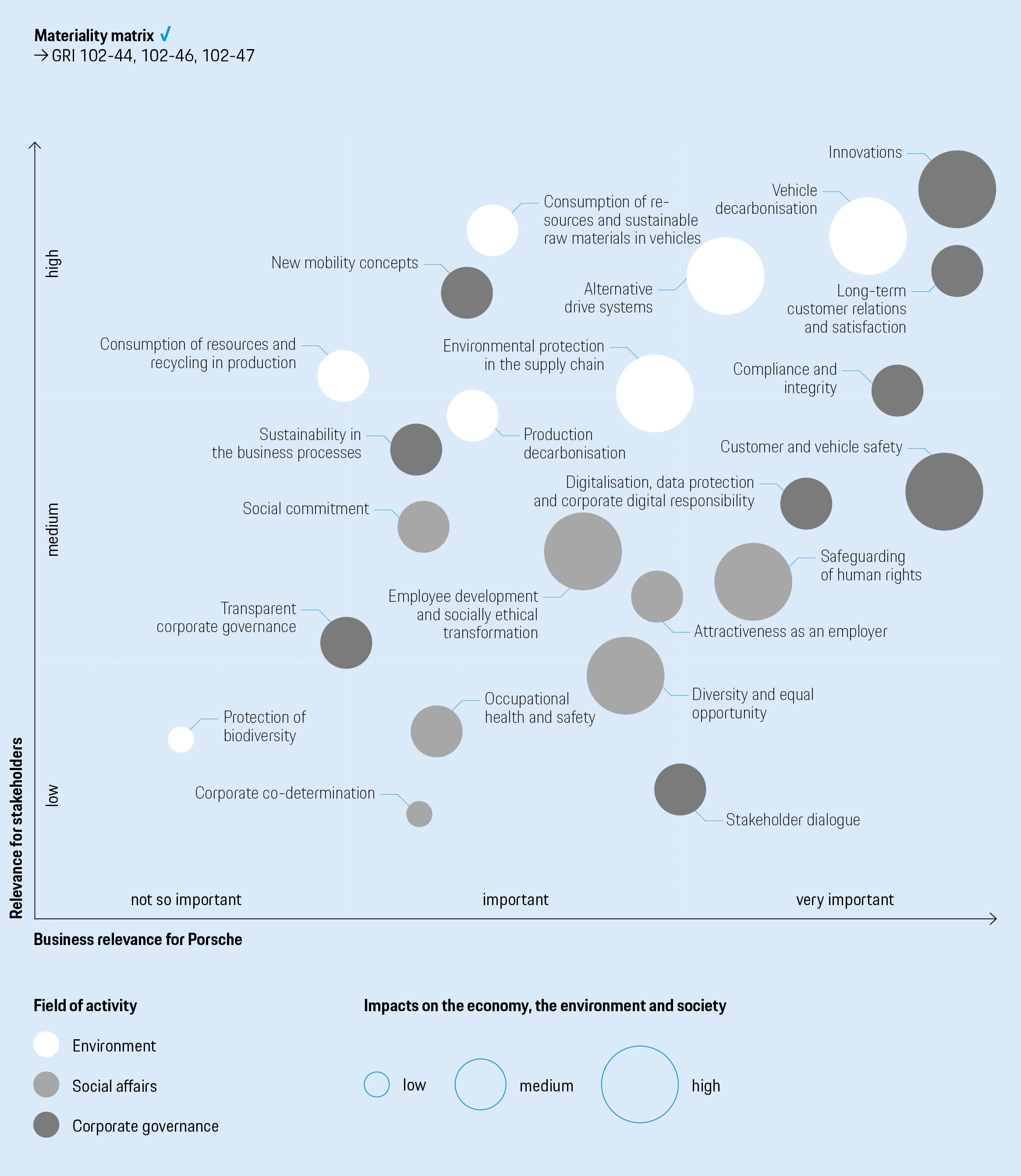The materiality matrix exemplifies the most important topics for Porsche and its stakeholders and their impacts on the economy, the environment and social affairs. The findings of the materiality analysis make an important contribution to the further development of Porsche’s Strategy 2030.
Since 2013, Porsche stakeholders have, upon request, been offering the company their views and expectations regarding sustainability and future challenges. This exchange and the materiality analysis process occur every two years and serve as the cornerstones of reporting on and the reviewing and further development of the company’s sustainability strategy.
In summer 2021, the sports car manufacturer invited various stakeholders to evaluate Porsche’s sustainability activities in an an-onymous, international online survey for the fifth time. In total, 1,440 people responded. Around 84 per cent of the responses came from European markets and around 14 per cent from China. Two per cent of the responses came from other international markets, but were included in the European evaluations due to their low numbers. Alongside customers, business partners, analysts/investors, politicians and representatives of public authorities, media outlets, and representatives from NGOs and academia, Porsche also surveyed a large number of its employees. Owing to the abundance of employee responses, the internal and external stakeholders were assessed using a 50:50 weighting. The responses from external stake-holder groups were weighted equally. The methodology and weightings are comparable to those of the previous survey conducted in 2019.
Before conducting the online survey, the company modified the selection of sustainability aspects in consultation with internal and external experts, taking into account recent changes and incorporating relevant topics from the Sustainability Strategy 2030. In all, the survey featured 23 key topics.
The members of the Porsche Sustainability Council also commented on the sustainability topics relevant to the company in personal expert interviews. They discussed their input with the Porsche Executive Board in the year under review. Overall, they praised the in-corporation of their input into the corporate strategy and the Executive Board’s active practising of this. At the same time, they referenced the topic of diversity and Porsche’s socially ethical transformation.
In late summer 2021, 23 identified sustainability topics were evaluated in detail from the company’s perspective in a multistage process. Management representatives from all the relevant departments, representatives of the corporate strategy and a selection of key markets evaluated and prioritised the topics. Their assessment was founded on the topics’ business relevance for Porsche regarding the opportunities and risks for business development, the corporate strategy and the business result. The circle of participants also evaluated the impacts of Porsche’s business activities on the economy, the environment and society based on the defined topics. Porsche combined the results with the stakeholder evaluations to create a materiality matrix.1
This exemplifies the most important topics for Porsche and its stakeholders and their impacts on the economy, the environment and social affairs. It also correlates them. The 2021 materiality matrix presents the topics with the highest prioritisation in the top right. A number of them differ from the 2019 materiality matrix in terms of their classification. The topic of “Innovations” was included in the evaluation for the first time in the year under review and was deemed a core topic both by the stakeholders and by the company. Both parties also rated the relevance of “Long-term customer relations and satisfaction” more highly. The aspect of “Consumption of resources and sustainable raw materials in vehicles” was likewise rated more highly. The topic of “Digitalisation, data protection and corporate digital responsibility”, which was featured in the survey for the first time, was given a similar evaluation. For the stakeholders, the topic of “Compliance and integrity” increased in importance.
The results of the materiality analysis were confirmed by the Environment and Sustainability Steering Group and by the Executive Board. Porsche presents all the material topics and how they are handled in the corresponding topic sections. Porsche has also incorporated other topics of relevance to the company into this report. The findings of the materiality analysis make an important contribution to the further development of Porsche’s Strategy 2030.
1 The materiality matrix sets the relevance for stake-holders (y-axis) against the business relevance for Porsche (x-axis). The assessments of the impacts of the business activities on the economy, the environment and society across the 23 key topics are presented in the form of circles of three different sizes representing three levels: “high”, “medium” and “low”. At the same time, colour coding is used to classify the three dimensions “Environment” (white), “Social affairs” (light grey) and “Corporate governance” (grey).



